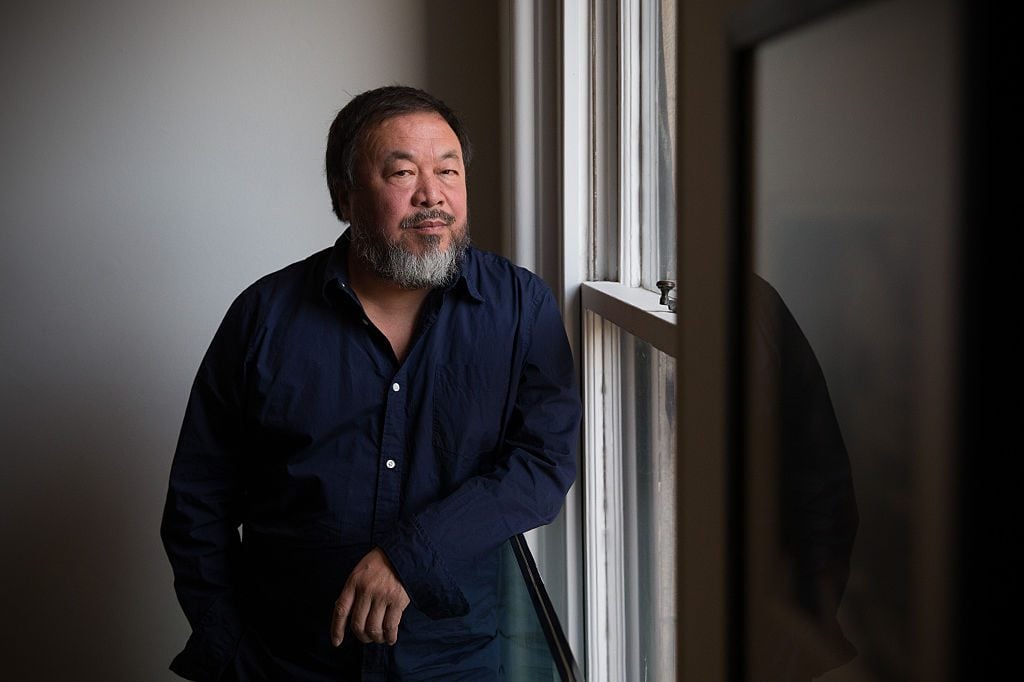Art World
Ai Weiwei ‘Shocked’ to Find Out the Real Estate Firm Selling His Berlin Apartment Used It for Unauthorized Commercial Film Shoots
The artist said he had no knowledge of the marketing events held in his former home in the German capital.

The artist said he had no knowledge of the marketing events held in his former home in the German capital.

Kate Brown

Only two years after leaving Berlin—and his issues with Germany—behind to move to the U.K., Ai Weiwei has told Artnet News that he was “shocked” to discover that a company that was supposed to be caring for and selling his old Berlin apartment instead allegedly used the space without his approval.
The Chinese artist claims that a real estate company with an office in Berlin that was helping to sell the apartment conducted several “unauthorized” advertising shoots and hosted events in his former home that he had no knowledge of. The company has disputed the claim.
The Chinese artist bought the apartment in Prenzlauer Berg, a rapidly gentrifying area in former East Berlin, back in 2015, while the dissident activist was still under house arrest in Beijing, China. Ai told Artnet News that, at the time he purchased the flat, he was only able to get his son and his son’s mother to Germany, while the artist awaited the return of his passport from Chinese authorities.
When he eventually resettled in Europe, with the support of the German government, Ai and his family lived in Berlin for several years. The home on Greifswalderstrasse, Ai said, had always been a positive space filled with touching memories. “This place gave me a long-lost sense of security,” Ai said. “From the day I was born, I was forced to constantly relocate together with my parents, to repeatedly leave a place and arrive in a new one, and to endlessly negotiate my identities.” He added that this feeling of safety the apartment brought him and his family made his discovery of alleged misuse harder to bear.
Although he maintains a studio in Berlin, Ai decided to leave Germany in 2019, publicly citing the political and social problems there as the reason for his departure. In June 2021, a bespoke real estate agency was enlisted to sell his apartment, offering marketing services to do so.
In early January, Ai said he was shocked to learn from his assistant that the apartment was being used for a film shoot for a chocolate brand. “She called to tell me that about 20 people were filming in my apartment,” Ai said. “I could never have imagined that the agency was renting out my flat to third parties for profit.” The company disputes the claim that there were 20 people in the apartment, adding that the purpose of allowing a video shoot there was to “attract… and further potential buyers in order to achieve the best possible price.”
The company, according to a termination of contract letter sent by Ai’s lawyer’s, which was shared with Artnet News, also made an extra copy of his keys. The company disputes this, saying they were authorized to access the apartment. But no one from the real estate agency was on-site, according to Ai’s assistant, who visited the apartment when the film company was found working there.
Ai said that it turned out the apartment had also been used for various commercial projects over the past six months without his knowledge, including product launches, advertising, and brand events. He said he and his team found scores of online posts with images taken inside the home promoting more than 35 brands or companies. One public relations associate had posted about the apartment on their business Instagram account, describing the place as a “second home.” The company said that the second-party realtor was informed about the collaborations and that Ai’s assistant visited the apartment frequently and “was part of the preparations now and then.”
One of the marketing projects included a promotion for the luxury paint brand Farrow & Ball, which repainted his apartment and held a photoshoot there. He said he was never sent the final photos or told when or where they would appear online. He said he was surprised to find them all over the internet when he and his team looked into the matter this month. “People are detached from moral restraints and exaggerate the beauty and happiness of life,” he said in his comment to Artnet News. “This is a popular disease of our era.”

One of Ai’s relatives prepares a meal in the Berlin apartment. Courtesy of the artist.
In their reply to Ai, which the artist shared with Artnet News, the company said that hosting such marketing events were part of its strategy to get the highest price possible for the apartment. They added that the company had an offer on the table and that an art world consultant from New York was interested.
Ai described the situation as a return to a “nightmare” of having his personal boundaries crossed. “When I saw my ‘home’ interpreted in a language and method so alien from my own, it shocked me far more than its destruction would have, and cast a great shadow over my memory,” the artist said. “When I saw my house transformed into a vessel for a group of commercial parasites to revel in, my sense of identity was once again overwhelmed by alienation. Only my familiar bewilderment remains.”
The experience will also probably do little to improve Ai’s tarnished feelings towards the country he once called home. The artist moved to Cambridge in 2019, decrying Germany’s rising populism and anti-refugee sentiments, as well as its coziness with China, as the reasons for his departure. “Germany is not an open society,” he told local press at the time. “It is a society that wants to be open, but above all it protects itself.” While the U.K. is not much more progressive, the artist later added, at least the people there are “polite.”
The final straw for Ai came when he reported that he and his family were harassed by a taxi driver in Berlin. The artist said that when he filed a police complaint, an official attributed the dispute to “cultural differences,” a term that Ai called “an elegant wrapper for structural discrimination” that “callously erases all the injustice an outsider has experienced.”